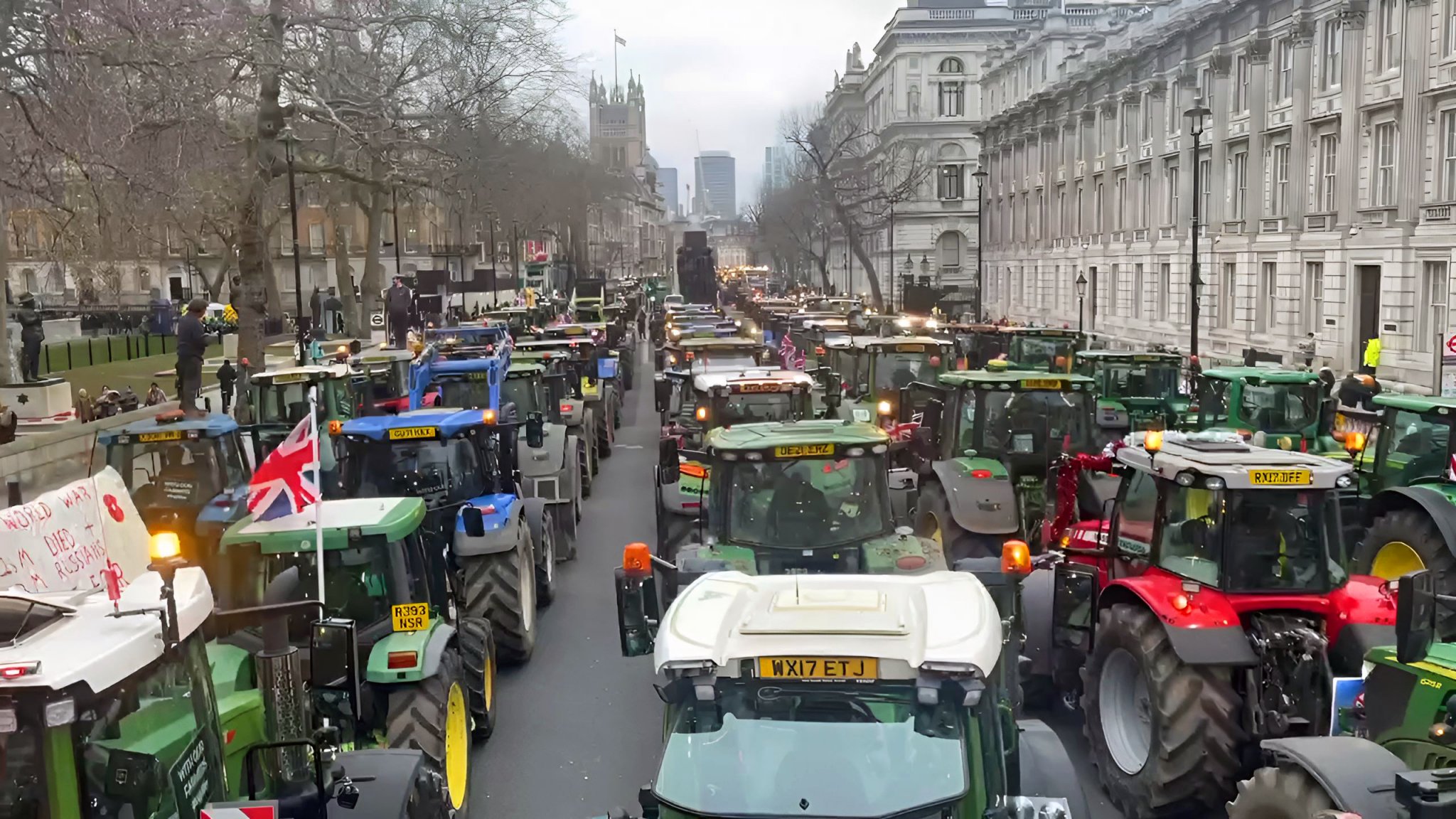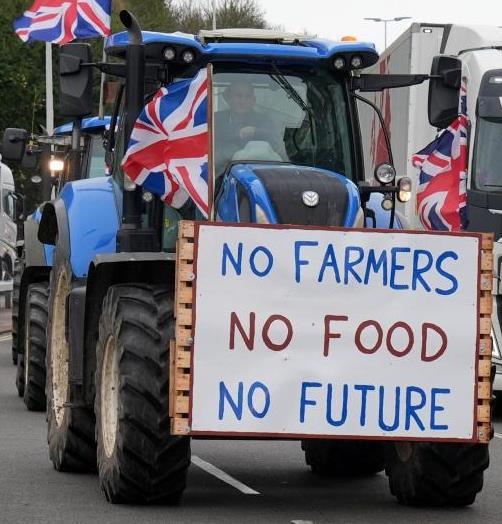
 |
||||
|---|---|---|---|---|
| Volume 54 Number 31, December 14, 2024 | ARCHIVE | HOME | JBCENTRE | SUBSCRIBE |
Workers' Weekly Internet Edition: Article Index :

Farmers' tractor rally in Whitehall, London, December 11,
2024
Farmers across Britain have been protesting against the government's inheritance tax changes introduced by Chancellor Rachel Reeves, which impose a 20% inheritance tax on agricultural assets exceeding £1 million, set to take effect from April 2026. The policy, farmers argue, will force farming families to sell all or parts of their farms to pay the new tax bills, threatening to destabilise small to medium-sized farms, which will in turn disproportionately affect rural communities reliant on farming.
On November 19, the National Farmers' Union (NFU) organised thousands of farmers to demonstrate outside Parliament in London. The event included lobbying MPs, where 1,800 NFU members met to urge policy reversals, and public demonstrations where protestors staged symbolic actions, such as leading children on toy tractors and wearing T-shirts bearing slogans. Though not officially part of the action, some protesters drove tractors through Westminster.

And on December 11 more than 600 tractors paraded through Westminster in a noisy protest against the Autumn Budget's impact on farming. Organised by Save British Farming (SBF) and Kent Fairness for Farmers, the rally showcased the growing frustration of farmers who believe government policies threaten the future of British agriculture and their livelihoods. Farmers had travelled from as far afield as Exmoor, Worcestershire, Somerset and the Isle of Wight. Although the NFU did not officially participate, its president, Tom Bradshaw, voiced support for the cause, acknowledging the strong feelings within the agricultural community and urging the government to take note.
Farmers Weekly reported: "Simultaneously, farmers in Yorkshire and Wales organised their own protests, amplifying the call for change. In York, more than 120 tractors filled the city centre in a rally headlined 'Save Family Farms'. Meanwhile, Welsh farmers gathered outside the Senedd in Cardiff, decrying the Welsh Labour administration's policies, which they say threaten farming."
The protests over the tax changes come in the wake of action held earlier in the year [1] to demand support for food production and to express concerns about the future of agriculture.
The context is a growing crisis in farming in Britain and across Europe, with rising costs for energy, fertilisers, and transport, while farm-gate prices are dropping. This situation is exacerbated by the dominance of oligopolies, which have the power to manipulate prices from land and other raw resources to livestock, feed, and fertilisers, while supermarkets fix prices without paying the price of production.
The global oligarchy is also facing contradictions, with competition for markets and control over regions and trade routes increasingly breaking out into war. Embargoes on Russian oil and gas have been a factor, while fertilisers from Ukraine and Russia have been a subject of contention, as has the waiving of quotas and duties on Ukrainian produce.
In their drive to monopolise the sector and create ever-larger farms, the oligopolies both manipulate prices and use their hold over public authority to drive smaller producers out of business.
In this continent-wide issue, farmers across Europe have also been protesting. Bulgarian farmers blocked roads in Sofia to demand government support for rising energy and fertiliser costs and for relief from EU regulations. Farmers in France, Italy and Greece staged demonstrations against agricultural policies, cheap imports, and rising costs.

Cannington Punjabi Club, Somerset, standing with Indian
farmers, 2021 - Photo: Examiner Newspapers
Farmers have also been in struggle globally, most notably in India, where agricultural workers have become highly organised and militant. Farmers in India are in action for a minimum support price for soya-bean, raising the demand for land, and against the government's land survey and corruption, as well as fighting against the criminalisation of dissent. In Uttarakhand, farmers are demanding payment of arrears from sugar mills amounting to over two billion rupees (£20 million) [2].
In Britain, the ruling elite and media are working to divide the developing movement and provide cover for the government's failure to address the crisis. By claiming to be affecting only the wealthiest estates - claims contested by farmers, who point to the rising value of land and the precarious nature of farming income - the government is trying to drive a wedge between town and country. It is in fact the richest and most powerful who are likely to benefit from the new measures, as small farms are forced to sell up, accelerating monopolisation.
Further, the government and media are fostering national chauvinism to block the movement by sowing divisions. It is significant then that farmers are standing together with agricultural workers internationally and uniting in opposition to the government. They are joining the collective demand of working people, stating "Enough is Enough!", and upholding the dignity of their labour.

Despite the destruction of productive forces, farming is still crucial for food production, with over half of food consumed in Britain being produced in the country [3]. These productive forces should not be further destroyed; destruction of the land and productive forces is an extremely dangerous trend carrying the real threat of starvation.
The issue raises the question of who owns the land. What purposes does it serve, whose interests are being put forward? Competing parts of the international oligarchy are seizing control of the land, using the public authority in their service, with its tax system, for this end. Neither should it be neglected that the Crown and aristocracy still own large sections of the land, forming themselves a competing part of these powerful interests vying for control.
The inheritance tax protests highlight growing tensions between Britain's farming community and the gatekeepers of power in parliament, as small and medium-sized farmers become increasingly marginalised from decision-making along with all other sections of the working people. The need for a decision-making role for those working the land, and for their concerns to be heard, and people to organise themselves to address the crisis in food and other sectors is crucial. The struggle of farmers and farm labourers is just; their problems are part of the problems of society in conditions of generalised chaos and destruction that all people face. It is agricultural workers who hold the solutions to the problems of food production; what they lack is the political power.
Notes
1. "Farmers across Britain and Europe are Joining Together to Fight for
their Rights", Workers' Weekly, March 30, 2024
https://www.rcpbml.org.uk/wwie-24/ww24-06/ww24-06-02.htm
2. "The Fight in India for People's Empowerment: Farmers Advance their
Demands without Letup", J Singh, Workers' Weekly, October 20,
2024
https://www.rcpbml.org.uk/wwie-24/ww24-26/ww24-26-09.htm
3. Britain imported 46% of food consumed in 2020; 54% was produced in the
country.
"An overview of the UK's food imports", SSO International
Forwarding, September 28, 2023
https://www.ssoif.co.uk/an-overview-of-the-uks-food-imports
(Sources: NFU, Politico, The Standard, The Independent, Farmers Weekly)
Receive Workers'
Weekly E-mail Edition: It
is free to subscribe to the e-mail edition
We encourage all those who support the work of RCPB(ML) to also support it
financially:
Donate to
RCPB(ML)
Workers' Weekly is the weekly on
line newspaper of the
Revolutionary Communist Party of Britain (Marxist-Leninist)
Website:
http://www.rcpbml.org.uk
E-mail:
office@rcpbml.org.uk
170, Wandsworth Road, London, SW8 2LA.
Phone: 020 7627 0599: